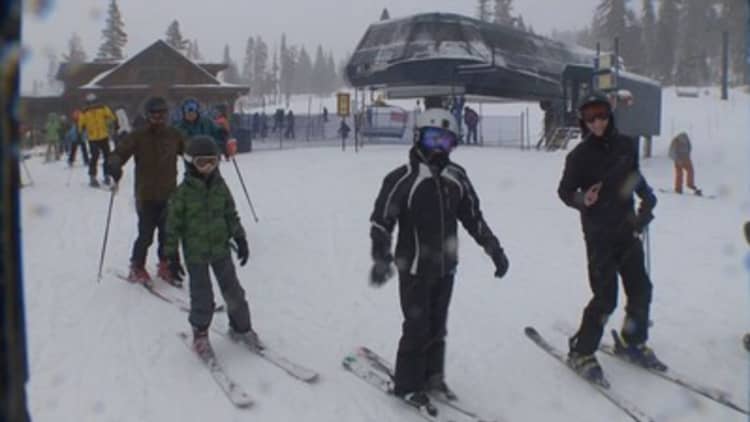
December's weather has been one for the books, with more than 2,800 temperature records already broken. Some 84 percent of the U.S. population has experienced temperatures that average over 5 degrees warmer than usual, according to The Weather Company.
Much of the warm weather is due to a phenomenon known as El Nino, which is transporting warm weather from the Pacific across the United States, which has delighted some.
But it's not all sunny news. In some cases the eastern U.S. has been experiencing temperatures as high as 40 degrees above average, while the south and mid-Atlantic have experienced deadly tornados and flash flooding. At the same time, Northern California has had snowstorms leading to treacherous conditions on the roads.
"We're seeing warm temperatures the likes of which we've never seen before," said Paul Walsh, The Weather Company's vice president of weather strategy, told CNBC's "On the Money" in an interview.
What's causing the unusual weather? Part of it is El Nino, which occurs every 7 to 8 years. But Walsh said climate change cannot be completely discounted.
"The effect of climate change is actually amplifying or juicing the impact," he added.
The unusual weather and its impacts are here to stay. Walsh expects the southern half of the U.S. to stay cold and wet, while the northeast and Midwest will start 2016 with mild weather.
"We're going to continue to see the weather playing a big role in shaping the economy and shaping consumer spending as we move into '16," Walsh said.
All the unusual weather is affecting the economy. According to The Weather Company, weather is one of the largest external swing factors in business performance, responsible for nearly a half trillion dollars of economic impact in the U.S. every year. Much of that is usually associated with heavy snow or powerful storms.
Last year, analysts at Goldman Sachs estimated that large snowfall shaved as much as half a percentage point from first quarter growth.
"The overall benefit…from the mild temperatures is helpful to the economy, but for certain sectors it's very, very unhelpful and actually very unwelcome," Walsh told CNBC. Places that benefit from snowfall, such as ski resorts, rely on winter weather to draw visitors.
Unusual side effects
Among the businesses benefitting from the weather are home centers, such as Lowe's and Home Depot, restaurants and outdoor entertainment, such as golf courses.
"We're seeing benefits for businesses we wouldn't normally see having benefits from the weather this time of year," Walsh said.
Home retailers are getting extra business from customers who are using the unseasonably warm weather for home repairs. That may be counterbalancing lost revenue from snow-related equipment that are normally big sellers around this time of year.
And outdoor entertainment has seen its season extended. In Buffalo, N.Y., which has seen no snow thus far this winter, breaking a 116 year record, golfers have enjoyed extra tee-time.
"Restaurants, especially compared to last year in the Northeast, restaurants are doing great business now because people are able to go out and go to the stores," said Walsh.
Feeling the heat
Many retailers have had to deeply discount winter clothing due to an abundance of stock. But this year's warm weather is only one factor.
November of 2014 was one of the coldest on record, and many store buyers made this year's purchase orders based on last year's high volume sold, according to The Weather Company and IBM.
The upside for retail, according to Walsh, was the strong demand for winter goods in the west.
Compared to last year, "demand levels…won't be as bad as people think, and I wouldn't be surprised if we see some of the large department store and specialty retailers" outperform, he added.
On the Money airs on CNBC Saturdays at 5:30 am ET, or check listings for air times in local markets.





